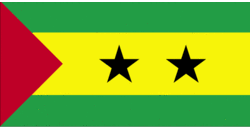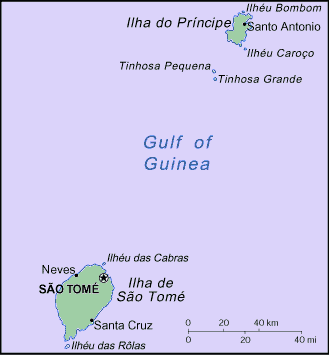Traveling Luck for Sao Tome and Principe. Sao Tome and Principe, Africa
Sao Tome and Principe is located in Western Africa, islands in the Gulf of Guinea, straddling the Equator, west of Gabon.
Land in Sao Tome and Principe is volcanic, mountainous.
Sao Tomean land covers an area of 1001 square kilometers which is more than five times the size of Washington, DC
 Sao Tomean national flag (Flag of Sao Tome and Principe)
Sao Tomean national flag (Flag of Sao Tome and Principe)
As for the Sao Tomean climate; tropical; hot, humid; one rainy season (October to May).
Sao Tomean(s) speak Portuguese (official).
Places of note in Sao Tome and Principe
 Sao Tomean map
Sao Tomean map
Regions of Sao Tome and Principe
Discovered and claimed by Portugal in the late 15th century, the islands' sugar-based economy gave way to coffee and cocoa in the 19th century - all grown with plantation slave labor, a form of which lingered into the 20th century. Although independence was achieved in 1975, democratic reforms were not instituted until the late 1980s. Though the first free elections were held in 1991, the political environment has been one of continued instability with frequent changes in leadership and coup attempts in 1995 and 2003. The recent discovery of oil in the Gulf of Guinea is likely to have a significant impact on the country's economy.
This small, poor island economy has become increasingly dependent on cocoa since independence in 1975. Cocoa production has substantially declined in recent years because of drought and mismanagement, but strengthening prices helped boost export earnings in 2003. Sao Tome has to import all fuels, most manufactured goods, consumer goods, and a substantial amount of food. Over the years, it has had difficulty servicing its external debt and has relied heavily on concessional aid and debt rescheduling. Sao Tome benefited from $200 million in debt relief in December 2000 under the Highly Indebted Poor Countries (HIPC) program, and is expected to benefit from an additional round of HIPC debt relief in early 2006, to help bring down the country's $300 million debt burden. In August 2005, Sao Tome signed on to a new 3-year IMF Poverty Reduction and Growth Facility (PRGF) program worth $4.3 million. Considerable potential exists for development of a tourist industry, and the government has taken steps to expand facilities in recent years. The government also has attempted to reduce price controls and subsidies. Sao Tome is optimistic about the development of petroleum resources in its territorial waters in the oil-rich Gulf of Guinea, which are being jointly developed in a 60-40 split with Nigeria. The first production licenses were sold in 2004, though a dispute over licensing with Nigeria delayed Sao Tome's receipt of more than $20 million in signing bonuses for almost a year. Real GDP growth reached 6% in 2004, and also probably in 2005, as a result of increases in public expenditures and oil-related capital investment.
Sao Tomean natural resources include fish, hydropower
the smallest country in Africa; the two main islands form part of a chain of extinct volcanoes and both are fairly mountainous
Sao Tomean religion is Catholic 70.3%, Evangelical 3.4%, New Apostolic 2%, Adventist 1.8%, other 3.1%, none 19.4% (2001 census).
Natural hazards in Sao Tome and Principe include NA.
Travel Advice for Sao Tome and Principe
Sao Tome & PrincipeSUMMARY
- There is no British Embassy in São Tomé and Principe, but there is an Honorary British Consul in São Tomé. São Tomé and Principe is covered from the British Embassy in Luanda, Angola. Please see the General section of this travel advice for more details.
- The threat from terrorism is low. But you should be aware of the global risk of indiscriminate terrorist attacks which could be against civilian targets, including places frequented by foreigners.
- Most visits to Sao Tome are trouble free. The main type of incident for which British nationals require consular assistance is in relation to passports and identity documents. Crime rates are generally low, but armed robberies do occur.
- We strongly recommend that you obtain comprehensive travel and medical insurance before travelling. You should check any exclusions, and that your policy covers you for the activities you want to undertake. Please see Travel Insurance
SAFETY AND SECURITY
Crime rates in São Tomé and Principe are generally low, but burglaries and armed robberies do occur. Beware of pickpockets, particularly at the beach. Take sensible precautions. Safeguard valuables and cash. Deposit them in a hotel safe, where practical. Keep separate copies of important documents, including passports, separately.
Political Situation
São Tomé and Principe is generally peaceful.
Economic difficulties and political rows over the handling of investments in the islands’ development occasionally lead to civil unrest. You should avoid any demonstrations or large gatherings.
Local Travel
Seats on the small aircraft that operate between the main island of São Tomé and the smaller island of Principe need to be booked well in advance or there is a risk that you could become stranded. On São Tomé, there are shared taxis but no other public transport in São Tomé and Principe.
Road Safety
Traffic is light but the majority of roads are in poor condition, particularly outside the capital. Roads are badly lit. Be particularly alert after dark to the danger of animals on the road.
Air Safety
The EU has published a list of air carriers that are subject to an operating ban or restrictions within the community. You should check the following link to see whether this will affect your travel: http://europa.eu.int/comm/transport/air/safety/flywell_en.htm
LOCAL LAWS AND CUSTOMS
ENTRY REQUIREMENTS
HEALTH
GENERAL
OTHER

 Search
Search Sao Tome and Principe country profile
Sao Tome and Principe country profile Travel advice for Sao Tome and Principe
Travel advice for Sao Tome and Principe